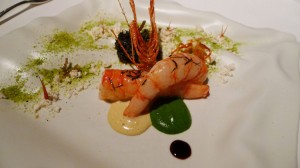
It’s a tonic not just for the hospitality sector but for the country as a whole that El Celler de Can Roca in Girona has been named the world’s best restaurant. Nice too that Can Roca, which specialises in culinary experimentation (desserts that smell of recognisable perfumes, for example) is run by three brothers. When Joan Roca, head chef and oldest of the three, was asked at the award ceremony in London on Monday to identify the restaurant’s winning ingredients he cited hard work and the help of two extraordinary siblings.
The latest generation in a family of restaurateurs, the Roca brothers inherited skills and enthusiasm rather than boundless start-up capital from their parents (which is not to suggest that their menu isn’t pricey: it is).
Can Roca, like elBulli, the Catalan restaurant which won the same citation as the world’s best a record five times, and Mugaritz and Arzak in the Basque Country, which retain their place this year in the top 10, shows that talent can win through, even in the middle of a perfect economic storm. Such businesses are a model for turning the tide. They can create jobs – but only if bureaucracy helps rather than hinders the entrepreneurial drive to go it alone and start up a new company in the first place.
Performance enhancement
A good week for restaurants. For sport, not so much. At the end of a high-profile trial (which followed a criminal investigation lasting years) a Madrid court on Tuesday found Doctor Eufemiano Fuentes – accused of being the central figure in an international athletics doping network – guilty of public health violations and sentenced him to a small fine and a year in prison which, for procedural reasons, he is unlikely to serve.
Dr Fuentes has candidly acknowledged that his clients were drawn from a broad range of disciplines including cycling, athletics, soccer, boxing and tennis. Now the status of 200 “bags of blood” and accompanying documentation, which the judge has ordered to be destroyed, is the subject of an appeal to the Supreme Court as anti-doping activists say this evidence could be used to win convictions in future cases. Thus the sorry saga continues.
There can’t surely be very much fun or personal satisfaction in sports that involve performance enhancing blood transfusions. If the case has done any good at all, perhaps it has been in exposing (yet again) a sporting culture that shows all the commitment to fairness and ethical behaviour of, say, the banking sector.
Retirement benefits
Bankia, which lost €19 billion last year, has just announced that it moved back into profit in the first quarter of 2013, lending substance to chairman José Ignacio Goirigolzarri’s prediction that it will soon be possible to start paying back the public funds that currently make the Spanish people majority shareholders in the bank.
As Mr Goirigolzarri appeared to be riding high, the chief executive of the Eurozone’s largest bank appeared, somewhat unexpectedly, to have been brought low.
On Monday, 70-year-old Alfredo Sáenz announced his resignation from Santander. In addition to overseeing the group’s spectacular global expansion over the last decade, Mr Sáenz has been embroiled in an interminable battle to extricate himself from a guilty verdict in a court case that originated two decades ago.
Still, a career in banking, even when it comes to an end, has its compensations. Mr Sáenz’s retirement plan is reported to be worth a little over €88 million, which will allow him to dine at the very best restaurants without worrying excessively about whether the bread is extra or how much to tip the waiter.
Bankia chairman Goirigolzarri was similarly blessed in 2009 when he secured a package of around €3 million a year on his retirement from BBVA at the age of 55.
Bankers, no doubt, are entitled to be rewarded for their hard work, just like restaurateurs. Perhaps they can even make a case that – in view of the currently very challenging and stressful operating environment – compensation should be rather more than that enjoyed by most pensioners. But millions of times more? Food for thought, undoubtedly.
To read more by Anna Maria O’Donovan visit My Spanish Interlude.
Leave a Reply
You must be logged in to post a comment.